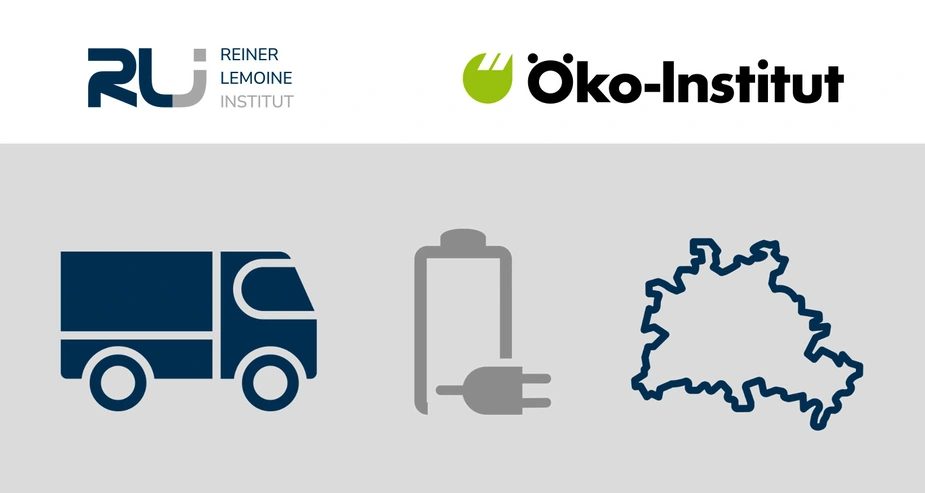Up to 26,000 electric trucks in Berlin by 2045
Study by Reiner Lemoine Institute and Öko-Institut shows how the electrification of road freight transport can be achieved
By 2045, up to 26,000 electric trucks with a total electricity demand of up to 430 GWh per year could be registered in Berlin – this corresponds to the annual consumption of around 100,000 households and requires a strong and sustainable power grid. The charging infrastructure (LIS) in the capital must be expanded in line with demand. In order to achieve the climate targets for 2045, the electrification of this transport sector is a crucial building block. It can also help to improve air quality in the capital and reduce noise pollution. These are the results of a joint study by scientists from the Reiner Lemoine Institute (RLI) and the Oeko-Institut in a joint study for the Berlin Agency for Electric Mobility (eMO).
“Our results show that we must now plan and expand the energy supply and charging infrastructure for electric commercial vehicles in Berlin in a targeted manner. The market ramp-up must be accompanied by data. Location analyses and monitoring help to plan and successfully implement charging infrastructure in a tailor-made manner,” says Jakob Wegner, researcher in the unit Mobility with Renewable Energy at RLI and head of the project.
The aim of the study was to forecast the charging demand for heavy electric commercial vehicles (> 3.5 t) in Berlin until 2045 and to derive options for action for politics and business. The project team has formulated 23 recommendations for measures, primarily for the state agency eMO Berlin as well as the other Berlin state administration and policy, which will be incorporated into the catalogue of measures of the overall charging infrastructure strategy of the state of Berlin. The key findings of the study are:
- Battery-powered trucks are a key to climate neutrality in Berlin – but they are hardly on the roads yet.
Less than 1 % of heavy trucks in Berlin are currently electric. This means that the potential for CO₂ savings in freight transport is still largely untapped. - By 2045, the number of electric trucks weighing more than 3.5 t will grow to up to 26,000 vehicles – their electricity requirements are equivalent to those of 100,000 households.
Depending on the scenario, the electricity demand for electric trucks will increase to up to 430 GWh in 2045. This requires a strong and forward-planned power grid. Compared to the predicted demand for electric cars, however, this is little. In comparison, the demand for electric cars in 2030 will already exceed 700 GWh. In addition, Stromnetz Berlin plans to significantly expand its grid capacity. The electricity grid operator plans to double its grid capacity by 2030. - Companies are central charging locations: More than 80 % of the electricity is charged directly into the vehicles on company premises.
Charging in one’s own depot is the most important use case. Publicly accessible charging hubs should complement the offer, especially for long-distance transport and cases where no charging infrastructure can be set up in the depot. - Berlin will need up to 360 publicly accessible charging points for heavy-duty traffic in 2045.
Additional demand is emerging on publicly accessible areas – charging hubs in industrial parks and on transport axes are becoming crucial. - Charging infrastructure must be built where many trucks are already on the road today: industrial and logistics locations offer the greatest potential.
Manufacturing and logistics centers are the hotspots of the future of electric trucks. This is where the development of charging infrastructure should start as a priority. - Berlin needs tailor-made solutions for the city and the surrounding area.
In the city centre, space and grid connections can become scarce. Most of the charging demand will arise in the Brandenburg area, as this is where the major logistics centers are located. This is where cooperation with Brandenburg municipalities and companies helps.
Data gaps must be closed
In order to implement the charging infrastructure strategy, current data gaps must be closed. “We still know too little about the actual deployment patterns and locations of the trucks. This delays the switch to electric mobility. Close cooperation between public administration, the private sector and distribution system operators is necessary to create the charging infrastructure where it is most urgently needed: at the places where most trucks start and end,” says Wegner.
Improving air quality and reducing noise
The conversion of truck traffic in Berlin to electric mobility can have a positive impact on other living and working areas of Berlin’s citizens: A climate-friendly truck fleet could not only improve air quality and noise in the capital, but also working conditions for people in the transport sector.
Method
For the calculations, the RLI experts recorded the status quo, identified relevant location categories and charging use cases, and recorded the current status of the electrification of heavy commercial vehicles. Using geoanalysis, the team has found important locations for the LIS setup. In addition, the experts examined the mobility behavior of heavy trucks in Berlin. To do this, they analyzed data sets to record journeys and parking operations of heavy commercial vehicles in Berlin, broken down by vehicle class and industry. The study is intended for the internal use of the eMO and the Senate Administration and is not publicly accessible.
- PDF summary of the results (in German)
- Project website
Contact:
Jakob Wegner
Reiner Lemoine Institut
+49 30 1208434-87
jakob.wegner(at)rl-institut.de
reiner-lemoine-institut.de
RLI press release, 12 August 2025
